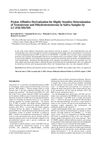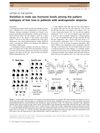 3 citations,
December 2011 in “Pediatric Dermatology”
3 citations,
December 2011 in “Pediatric Dermatology” The patient's long-term hair loss was caused by leukemia treatments and low estrogen levels, worsened by her genetic tendency for hair loss.
49 citations,
March 2017 in “PubMed” Enhancers and super-enhancers are key in controlling specific gene activity and can play a role in cancer development.
 February 2024 in “International Journal of Molecular Sciences”
February 2024 in “International Journal of Molecular Sciences” Hair loss in Androgenetic Alopecia is caused by genetics, aging, and lifestyle, leading to hair follicle shrinkage and related health risks.
 57 citations,
December 2018 in “JAMA Surgery”
57 citations,
December 2018 in “JAMA Surgery” Hormone treatment for transgender patients may not need to be stopped before surgery, but more research is needed, especially on estrogen.
 4 citations,
April 2002 in “Medical Hypotheses”
4 citations,
April 2002 in “Medical Hypotheses” Hormones cause hair loss by affecting cell growth and weakening cell attraction.
 204 citations,
May 2014 in “The Journal of Sexual Medicine”
204 citations,
May 2014 in “The Journal of Sexual Medicine” Hormone therapy for trans individuals is effective and generally safe in the short term.
 59 citations,
August 2018 in “The oncologist”
59 citations,
August 2018 in “The oncologist” Some breast cancer patients still experience hair loss three years after chemotherapy, especially with taxane-based treatments.
 30 citations,
January 2008 in “The Aging Male”
30 citations,
January 2008 in “The Aging Male” The study found no link between baldness patterns and androgen levels in men with benign prostate enlargement or prostate cancer.
 10 citations,
February 2020 in “Endocrine”
10 citations,
February 2020 in “Endocrine” Finasteride safely treats hair loss without harming hormones or reproduction, but may slightly reduce sexual function.
 9 citations,
July 2014 in “Experimental Dermatology”
9 citations,
July 2014 in “Experimental Dermatology” PTHRP agonists can stimulate hair growth, especially in damaged follicles, while antagonists may initially increase growth but ultimately inhibit it.
 8 citations,
July 2018 in “Analytical sciences”
8 citations,
July 2018 in “Analytical sciences” Using 5-butylpicolinate esters improves the sensitivity and reliability of detecting testosterone and dihydrotestosterone in saliva.
 116 citations,
May 1992 in “The American Journal of Medicine”
116 citations,
May 1992 in “The American Journal of Medicine” Flutamide rarely causes liver toxicity in prostate cancer patients.
 91 citations,
December 2017 in “Systems Biology in Reproductive Medicine”
91 citations,
December 2017 in “Systems Biology in Reproductive Medicine” Lower SHBG levels may increase the risk of PCOS.
 24 citations,
November 2015 in “Annals of Nutrition and Metabolism”
24 citations,
November 2015 in “Annals of Nutrition and Metabolism” Certain SHBG gene variants, like rs727428, are linked to higher testosterone levels in women with PCOS.
 19 citations,
October 2008 in “Journal der Deutschen Dermatologischen Gesellschaft”
19 citations,
October 2008 in “Journal der Deutschen Dermatologischen Gesellschaft” Anti-cancer treatments can cause reversible hair loss, skin sensitivity, pigmentation changes, nail damage, and skin reactions, with a need for more research on managing these side effects.
 15 citations,
May 1997 in “Annals of Internal Medicine”
15 citations,
May 1997 in “Annals of Internal Medicine” Tamoxifen caused hair loss in a 52-year-old woman.
 3 citations,
January 2021 in “Skin appendage disorders”
3 citations,
January 2021 in “Skin appendage disorders” Hair loss due to scalp metastasis from breast cancer, known as Neoplastic Alopecia, has a better survival rate than other scalp metastases and requires a biopsy for diagnosis.
 March 2017 in “Journal of Dermatology”
March 2017 in “Journal of Dermatology” Different hair loss patterns may be linked to varying male hormone levels.
 28 citations,
September 2017 in “Gynecological Endocrinology”
28 citations,
September 2017 in “Gynecological Endocrinology” Women with PCOS have higher levels of AMH in their blood and follicles, and this can help predict their risk of overreaction to fertility treatments.
 19 citations,
August 2014 in “Journal of Ethnopharmacology”
19 citations,
August 2014 in “Journal of Ethnopharmacology” The study created a test that found hormonal and toxic effects in plant and fungal extracts using prostate cancer cells.
 6 citations,
January 2013 in “Journal of Clinical and Diagnostic Research”
6 citations,
January 2013 in “Journal of Clinical and Diagnostic Research” AMH levels are higher in women with PCOS and can indicate the number of small follicles in their ovaries.
 4 citations,
October 2007 in “Dermatologic Clinics”
4 citations,
October 2007 in “Dermatologic Clinics” Glucocorticoids and sex hormones affect skin health, with potential for targeted treatments to minimize side effects and treat skin conditions.
 60 citations,
April 2010 in “General and Comparative Endocrinology”
60 citations,
April 2010 in “General and Comparative Endocrinology” Fadrozole and finasteride change gene expression related to sex hormones and thyroid hormones in frog larvae development.
 5 citations,
January 2016 in “Asian pacific Journal of Tropical Biomedicine”
5 citations,
January 2016 in “Asian pacific Journal of Tropical Biomedicine” Phthirusa pyrifolia extract may lower testosterone and harm male rat reproduction without damaging the liver or kidneys.
 148 citations,
April 2009 in “Molecular Pharmaceutics”
148 citations,
April 2009 in “Molecular Pharmaceutics” Researchers developed promising agents for prostate cancer imaging, with the best one showing high potential for clinical use.
 41 citations,
November 2003 in “Annals of the New York Academy of Sciences”
41 citations,
November 2003 in “Annals of the New York Academy of Sciences” Male hormones, or androgens, affect women's health in areas like mood and bone density, and hormone replacement therapy using antiandrogenic progestogens can improve mood disorders and alertness in menopausal women.
 2 citations,
January 2013 in “Elsevier eBooks”
2 citations,
January 2013 in “Elsevier eBooks” The chapter explains the causes of excessive hair growth and masculinization in women and how to measure hormone levels related to these conditions.
 54 citations,
November 2001 in “Urology”
54 citations,
November 2001 in “Urology” The length of the CAG repeat in the androgen receptor gene affects the risk and progression of prostate cancer, BPH, infertility, and undermasculinized genitalia.
 32 citations,
March 2019 in “Climacteric”
32 citations,
March 2019 in “Climacteric” Premature ovarian insufficiency (POI) can harm women's sexual health, and they may benefit from hormone therapy and counseling.
 22 citations,
January 2015 in “The Cochrane library”
22 citations,
January 2015 in “The Cochrane library” DHEA may help with sexual function when used intravaginally by menopausal women but is similar to hormone therapy in other aspects and might cause more side effects like acne and hair loss.




























